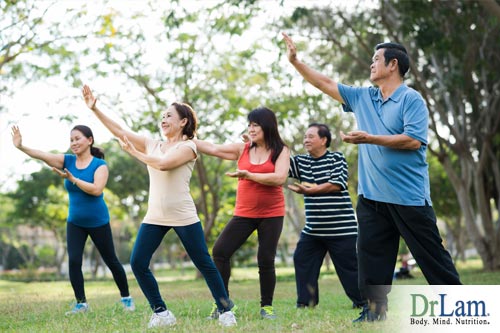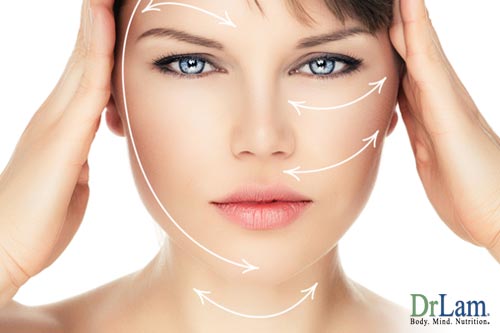 There are many benefits of a regular tai chi workout, a traditional martial art from China. It helps control pain and improve balance. It is of special importance to the elderly who are more susceptible to bones breaking and need a gentle exercise that helps avoid falls. It has long been confirmed to benefit those with fibromyalgia and those who have mild or moderate Parkinson’s. Additionally, it is beneficial to blood pressure and improves aerobic capacity.
There are many benefits of a regular tai chi workout, a traditional martial art from China. It helps control pain and improve balance. It is of special importance to the elderly who are more susceptible to bones breaking and need a gentle exercise that helps avoid falls. It has long been confirmed to benefit those with fibromyalgia and those who have mild or moderate Parkinson’s. Additionally, it is beneficial to blood pressure and improves aerobic capacity.
New research has shown that a tai chi workout is able to increase CD34+ cells in the human body. CD34+ cells are stem cells. Stem cells are, in essence, blank cells that are able to change into different types of cells. This has an impact on aging.
Research conducted at the Center of Neuropsychiatry at China Medical University Hospital in Taiwan saw a significant rise in the CD34+ cells of participants in the research program who engaged in Tai Chi during the research period. All participants were of a similar background. The study was conducted on college students who are all around twenty years old. The reason for this was that older participants could affect the results due to existing medical problems. The study was thus conducted on a relatively healthy sector of the population.
Three groups were used in the study. One group did not exercise, one group practiced Tai Chi, and the third participated in brisk walking. Those who did Tai Chi were found to have much higher levels of CD34+ cells than those in the group who did no exercise whatsoever. It was also higher than the group who had engaged in brisk walking. The CD34+ protein is a cluster marker for blood cells that are involved in a cell’s self-renewal, differentiation, and proliferation. This would thus suggest that Tai Chi, as a sport, could combat the ravages of aging.
The entire study took place over the period of a year. Interestingly, it was found that up to three months of Tai Chi training had no real effect on the rise in CD34+ cells. This implies that long-term practice of a tai chi workout is important in order for the benefits to be seen.
Tai Chi is known to decrease sympathetic nervous system (SNS) activity in older people who are healthy. Those who are in advanced adrenal fatigue tend to do less well if their body is weak. The SNS is responsible for the fight or flight reaction when a body encounters stress. It does so by the secretion of two hormones: norepinephrine, which prepares the body for stress, and epinephrine, which activates certain parts of the body to react. These hormones are produced by the adrenal glands.
 Although the endocrine system is not an integral part of the nervous system, it is important as a communication system throughout the body. The different glands in this system secrete hormones, which act as chemical messengers to different parts of the body, in order to ‘tell’ them what is needed in any given situation.
Although the endocrine system is not an integral part of the nervous system, it is important as a communication system throughout the body. The different glands in this system secrete hormones, which act as chemical messengers to different parts of the body, in order to ‘tell’ them what is needed in any given situation.
The two systems are linked by means of the brain, specifically the hypothalamus. Its function is to regulate all our basic needs, such as hunger, sleep, stress, and our emotional responses. The hypothalamus also controls the pituitary gland, which in turn controls the release of different hormones in the endocrine system.
The hypothalamus makes up part of the hypothalamic-pituitary-adrenal (HPA) hormonal axis. The adrenal glands, which are situated on top of each of the kidneys, release, amongst a number of hormones, cortisol. It is the most important anti-stress hormone in the body.
When conditions are such that the body is put under more and more stress, the result is an increase in stress hormones in order to counterbalance the effects. When the stress, however, becomes even more, the adrenal glands have difficulty functioning. The HPA axis has difficulty keeping up, and the NeuroEndoMetabolic (NEM) Stress Response system is activated.
Once adrenal fatigue starts setting in, the body responds by making use of other pathways and organs to combat the problem. As the body is no longer able to produce sufficient amounts of the hormones needed to address the problem, adrenal exhaustion comes into play and a diverse number of symptoms are seen. These include anxiety, depression, chronic fatigue, feeling cold all the time, insomnia, and joint pains, to name but a few. Interestingly, Parkinson’s which usually affects the elderly, and fibromyalgia, are also related to adrenal gland fatigue.
Aging also affects adrenal function, and thereby, the functioning of the HPA axis. Aging results in a reduction in growth hormones. Although the hypothalamus may function as it always has, the other components in the endocrine system slow down. They are less able to function at their optimal levels, thereby putting additional stress on the adrenal glands. In time, this, too, can lead to adrenal gland dysfunction and the resulting consequences.
The body’s NEM stress response can only handle the burden for so long before adrenal exhaustion sets in and a total crash occurs. This is referred to as the fourth stage of adrenal fatigue. You, in effect, suffer from total burnout.
David Breault, Principal Faculty member at HSCI, has conducted research on how the adrenal glands use cellular reprogramming (i.e. change the function of stem cells) for their daily maintenance and regeneration after injury. The stem cells, which are ‘blank cells’, actually undergo a change in function in order to help repair the adrenal glands.
The adrenal glands are one of the organs in the body that constantly undergoes regeneration. Because Tai Chi actively contributes towards the production of CD34+ stem cells, the age-old Chinese martial art actively works towards renewal in the body, as these stem cells are used in adrenal gland rejuvenation.
 Not only are these stem cells a source for adrenal rejuvenation and, therefore, necessary to combat many of the symptoms found in those that have adrenal fatigue, but they also help with skin rejuvenation. The skin is one of the first areas on the body that show the physical signs of aging.
Not only are these stem cells a source for adrenal rejuvenation and, therefore, necessary to combat many of the symptoms found in those that have adrenal fatigue, but they also help with skin rejuvenation. The skin is one of the first areas on the body that show the physical signs of aging.
As discussed above, Tai Chi is able to help reduce SNS stimulation. The SNS is often activated as a compensatory mechanism in the body due to a lack of energy and hormone production from the adrenal glands. This can lead a person to feel anxious, wired or tired, and experience heart palpitations or blood pressure fluctuations. Helping the SNS calm down is vital to allowing the body to relax and the adrenals to heal.
In advanced stages of adrenal fatigue, any form of exercise may place too much stress on the body and the adrenal glands, leading to a crash. Exercise takes energy and increases free radicals in the body. When the body is already in a low energy state, it can ill afford to expend any more energy on exercise or other non vital activities. Free radicals can also take a toll and add cellular damage onto the body, which it must work to repair, once again increasing energy expenditure. It is thus advised that those in very advanced stages of adrenal fatigue practice tai chi, and any exercise, with extreme caution. If uncertain, always consult with your primary medical doctor or an experienced clinician before starting on an exercise program.
However, for many, a regular tai chi workout can have very positive health effects and is a wonderful option to pursue to help the body improve its ability to heal itself.
